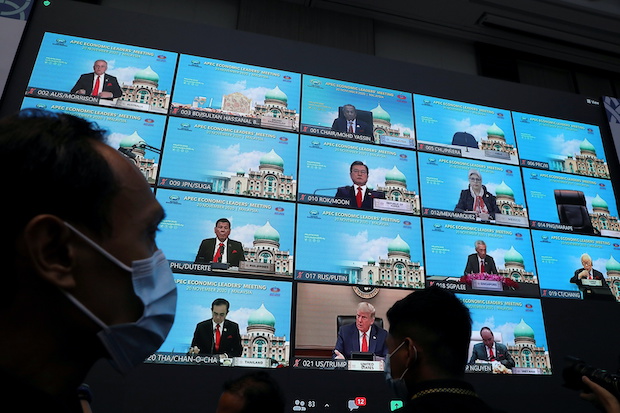APEC agrees to expedite transit of COVID-19 vaccines, related goods

A view shows virtual APEC Economic Leaders Meeting 2020, in Kuala Lumpur, Malaysia, Nov. 20, 2020. (File photo from REUTERS)
MELBOURNE — Ministers from Asia-Pacific trade group APEC on Saturday agreed to expedite the transit of COVID-19 vaccines and related goods, but stopped short of agreeing to remove tariffs on them.
Prior to the start of the meeting, host New Zealand wanted APEC’s 21 members to agree on “best practices guidelines” on the movement of vaccines and related medical products across borders, a person familiar with the talks told Reuters.
New Zealand believes an agreement is needed to show that APEC is responsive and relevant to the crisis facing the world.
In a statement after the meeting, APEC ministers said they would “expedite the flow and transit of all COVID-19 vaccines and related goods through their air, sea and land ports.”
“We will consider voluntary actions to reduce the cost of these products for our people, particularly by encouraging each economy to review its own charges levied at the border on COVID-19 vaccines and related goods,” the statement said.
Article continues after this advertisementAPEC gatherings in recent years have struggled to reach agreements due to then-U.S. President Donald Trump’s trade war with China. The new Biden administration has promised a more multilateral approach.
Article continues after this advertisement“The successful distribution of vaccines across our region will be critical to our recovery,” New Zealand’s trade minister Damien O’Connor had told reporters ahead of the meeting.
Average APEC tariffs on vaccines are low at around 0.8% but other goods important in the vaccine supply chain face higher tariffs.
Alcohol solutions, freezing equipment, packaging and storage materials, vials and rubber stoppers face average tariff rates above 5%, and import tariffs can be as high as 30% in some APEC economies.
“What I’ve heard from these few days of interaction with my fellow ministers from the APEC region is broadly an agreement that we need to increase access to vaccines, increase supply of vaccines,” U.S. Trade Representative Katherine Tai told reporters before the meeting.
APEC ministers had also been expected to discuss support for the waiving of intellectual property (IP) rights for COVID-19 vaccines, an issue which is currently under negotiation at the World Trade Organization. India and South Africa are leading the push for waivers.
O’Connor said there are a range of challenges around production and distribution of vaccines that can be addressed to improve supply around the world, but gaining patent waivers could still be an obstacle.
“Having looked at all those challenges, if it is IP that is holding us back, I think that there will be consensus reached at the WTO. And I think as APEC economies, we certainly are going to ask for that to be considered seriously,” he said.